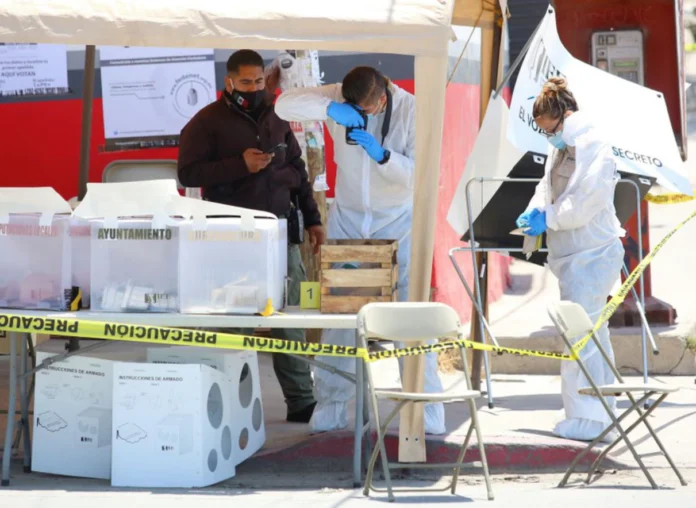
More and more countries are experiencing electoral processes marked by kidnappings, attacks, and assassinations. Candidates must not only worry about votes; they must now try to make it to the polls alive.
In a tense climate of political upheaval, Ecuador was holding its early 2023 presidential elections. However, the world’s attention was focused on the bulletproof vests worn by the candidates. In fact, bulletproof vests and personal bodyguards were the hallmark of the election campaign in a country besieged by drug trafficking and violence.
Similar measures should have been implemented in countries such as Mexico, Japan and Germany, where recent election campaigns have also exposed high levels of violence. We can observe a worrying increase in the number of attacks, kidnappings, assassinations, and threats suffered by candidates, political sympathizers or family members during the development of electoral campaigns.
On August 9, 2023, Ecuadorian presidential candidate Fernando Villavicencio was assassinated outside a political event. According to the Political Violence Observation Report prepared by the Citizen Observatory of Political Violence (OCVP), the MEGA Association and the Friedrich-Ebert-Stiftung of Ecuador, between 2022 and 2023 there were 88 attacks against people linked to politics. In Colombia, 325 victims of electoral violence were registered during the election year, according to the report on political-electoral violence by the Peace & Reconciliation Foundation (Pares).
In Mexico, the electoral period opened and closed with murders. On the same day that municipal campaigns began in April 2024, mayoral candidate Gisela Gaytán was gunned down. Hours before voting day, the candidate for mayor of the municipality of Cutzeo Israel Delgado Vega was shot and killed outside his home. According to Integralia Consulting, from September 2023 to May 1, 2024, 208 candidates or candidates were victims of violence in the country, including 29 murders. When officials, ex-officials, politicians, relatives, or collaterals are considered, the figure doubles, reaching 560 aggressions and 195 murders. On May 28, the head of the Secretariat of Security and Citizen Protection, Rosa Icela Rodriguez, confirmed that officially 8 candidates, 4 pre-candidates and 10 aspirants to some position had been assassinated up to that date. However, private consulting firms such as Data Cívica have registered 30 candidates or pre-candidates assassinated during 2024 (Figure published on June 3, 2024). These figures confirm this electoral process as the most violent in the history of the country.
However, it is naïve to think that these levels of political-electoral violence are limited only to our region: we can find several countries experiencing this problem. In July 2022, the then Prime Minister of Japan, Shinzō Abe, was shot and killed during a parliamentary campaign. Less than a year later, in April 2023, the Japanese Prime Minister, Fumio Kishida, had to be evacuated following an explosion during an election campaign. Japan, in fact, has a long history of attacks and assassinations of presidents and candidates. On the same continent, in 2023, the Philippines went through the most violent local elections in the country’s history, with the murder of 19 political activists during the month-long campaign.
In Europe, violence is also present in the current parliamentary election campaign. In Germany, on May 3, the leading Social Democrat candidate, Matthias Ecke, was brutally attacked while hanging election posters. Days later, candidate Yvonne Mosler was also assaulted and threatened. In fact, physical or verbal violence against elected officials or representatives has doubled in five years in the European country and in these months of 2024, 22 attacks on politicians have already been counted. Added to this is the assassination attempt against the Prime Minister of Slovakia, Robert Fico, and multiple attacks and threats against candidates and political sympathizers in France, Spain, and the Netherlands.
Against this backdrop, it is worth asking ourselves what is behind these increasing levels of political-electoral violence, and whether this reflects a trend that is becoming naturalized on the international scene. In the countries observed, this trend responds to various factors. In Latin America we can observe that these events are mainly linked to crises of violence and insecurity triggered by narco-criminal gangs, cartels and mafias. Added to this are the growing levels of clientelism, corruption and political polarization in the region. Meanwhile, in Europe, electoral attacks are mostly related to extreme political polarization and the resurgence of fanaticism and extreme factions. Meanwhile, in Asian countries such as Japan, we find that political violence is linked to isolated or mafia-orchestrated attacks. In the Philippines, meanwhile, it is caused by conflicts between rival clans that dominate different regions of the country.
Undoubtedly, electoral violence responds to various factors, and although many of them are shared around the world, there is no one factor that alone is sufficient to understand the rise of this phenomenon. This situation challenges governments and the democratic system itself by hindering electoral processes and questioning their ability to respond to the concerns of society, many of which are related to the triggers of this political violence. The suspension or postponement of elections due to the levels of conflict and political violence are an alarm. Are electoral processes in danger? Can democracies remain stable under these conditions?
Reality shows that most regions of the world are facing an escalation of violence during their electoral processes that puts increasingly fragile democracies at risk. The challenge for society and government is to identify and enhance ways for democracy to deal with and eliminate this trend.
*Translated by Janaína Ruviaro da Silva from the original in Spanish.


